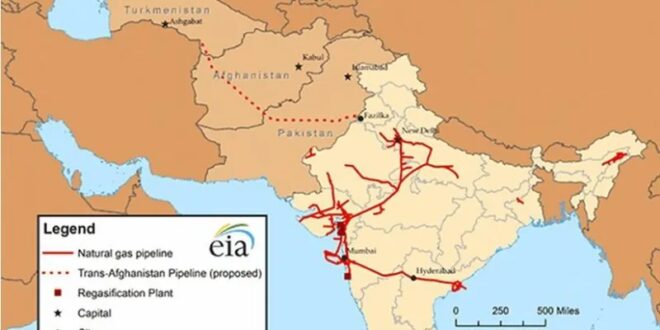Due to its strategic location, Afghanistan is an essential player in South Asia and Central Asia’s trade, energy, and commerce sectors. Numerous initiatives, such as the TAPI Pipeline, TUTAP Power Project, CASA-1000, and TAP, have attracted the country due to its ability to link these two regions. These initiatives aim to improve energy transmission and trade routes between regions, creating economic opportunities for Afghanistan and its neighbors. Despite obstacles, successfully implementing these initiatives could strengthen regional cooperation, promote economic development, and enhance the overall quality of life for the region’s inhabitants.
Significant energy and transportation efforts connecting Central Asia and South Asia through Afghanistan have been the subject of several attempts throughout the years. CASA-1000, TAP, the TAPI Pipeline, and the TUTAP Power Project are some of these initiatives. CASA-1000 and TAP are particularly significant in the energy sector, as they intend to transmit electricity from Kyrgyzstan to Afghanistan, Tajikistan, and Pakistan. With over sixty per cent of the CASA-1000 work already completed, these initiatives have the potential to benefit the economies of the participating nations significantly. Nevertheless, recent power shifts and the suspension of international development aid to Afghanistan have prompted efforts to recommence practical work on these initiatives.
Pakistan and Afghanistan are inseparable neighbors whose futures are connected in multiple ways. Pakistan has always shared a sense of destiny with its neighbor and hopes Afghanistan feels similarly. The two countries’ borders are complicated and porous, and their histories are intertwined. Both countries confront similar challenges and opportunities, and their success is interdependent. Through cooperative efforts, such as establishing transit and energy initiatives between Central Asia and South Asia via Afghanistan, these nations can work toward a brighter future for their citizens and the entire region.
Pakistan and Afghanistan are natural allies who have endured hardships together. Recent security concerns for both nations have been significant, risking their economies and societies. Pakistan and Afghanistan must collaborate to overcome these obstacles for their economies to thrive and develop. The TAP and CASA-1000 initiatives, which aim to create significant transport and energy links between Central Asia and South Asia via Afghanistan, may facilitate regional cooperation, economic growth, and stability. Everyone benefits when Pakistan and Afghanistan work together to advance their mutual interests and reduce regional tensions. Only through mutual respect, understanding, and collaboration will these two nations surmount their current obstacles and create a better future for their citizens.
The complex nature of Pakistan and Afghanistan’s political relationship results from the richness and diversity of their respective histories and their distinct geopolitical and internal dynamics. Border disputes, transnational terrorism, and political disagreements contribute to the instability and lack of collaboration between the two nations. However, there is cause for optimism due to recent initiatives to increase communication and strengthen ties between the two nations. Pakistan and Afghanistan can enhance regional security through their political cooperation. If the two nations collaborate and build trust, advancements in counterterrorism, border control, and the economy may be feasible.
Despite the challenges, there is a growing recognition that a solid political relationship between Pakistan and Afghanistan is essential for establishing a more secure and prosperous region for their citizens.The ambitious TAPI Pipeline, TUTAP Power Project, CASA-1000, and TAP aspire to connect Central and South Asia through Afghanistan. These projects might change the region’s energy and commerce environment, opening up new economic prospects. As a landlocked country with limited resources, Afghanistan would profit from these projects by accessing energy markets and transit income. These efforts confront security dangers, political instability, and environmental issues. The recent evacuation of Western soldiers and Taliban control in Afghanistan have complicated matters. Pakistan, a regional power and Afghanistan’s neighbor, is vital to these attempts. Pakistan can help parties communicate, secure Afghanistan, and mitigate these activities’ environmental and social implications. By doing so, Pakistan may improve its energy security, regional integration, and worldwide prestige.
 Eurasia Press & News
Eurasia Press & News




